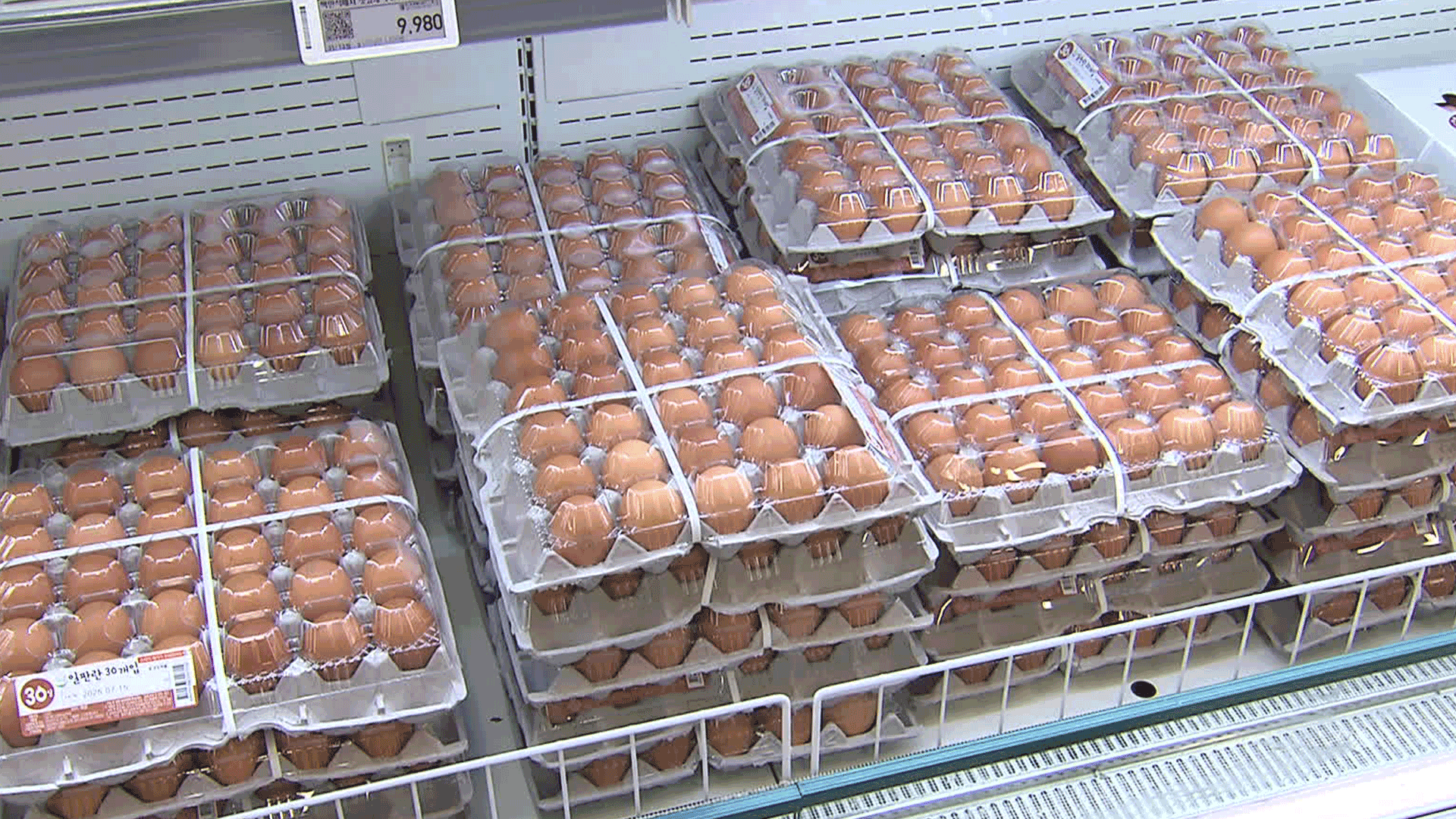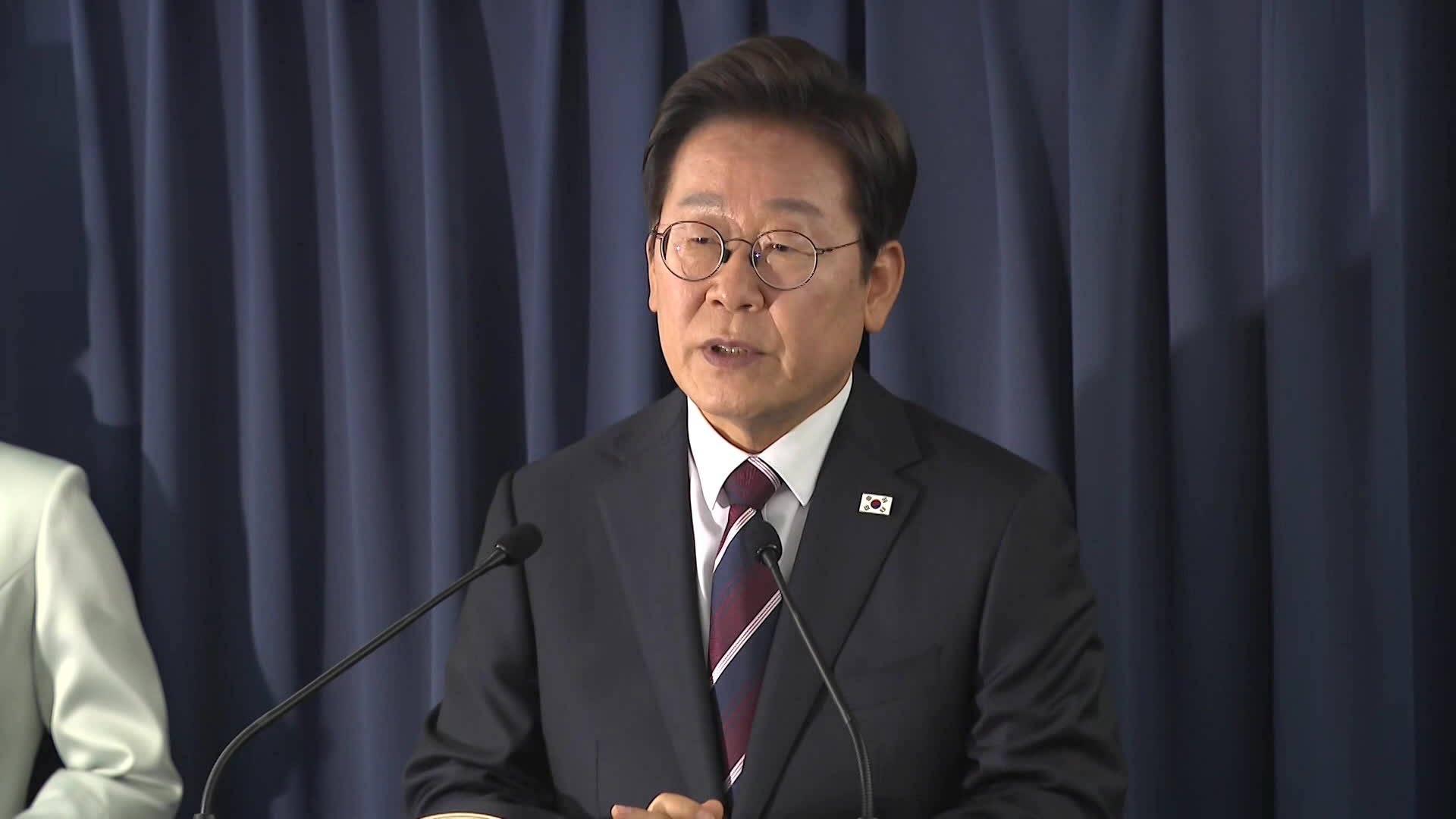[Anchor]
The government has also prepared measures to tackle the rapidly rising prices of food.
Recently, they have launched on-site investigations to determine if there is any collusion behind the rising egg prices, and have announced comprehensive measures for price regulation.
Kim Chae-rin reports.
[Report]
Egg prices have surpassed 7,000 won for the first time in four years, reaching a record high.
The government has taken decisive action to stabilize supply and demand.
First, they have begun an investigation into the egg producers' association, suspecting collusion, as there is no clear reason for the price increase.
[Lee Hyoung-il/Acting Minister of Economy and Finance: "We will implement tailored responses for items that require price and supply management. For eggs, we will push for a collusion investigation by the Fair Trade Commission regarding excessive increases in farm prices."]
They also plan to improve the price determination structure.
The practice of the egg producers' association announcing a standard price before transactions, which farmers were advised to reference, will be abolished, and a government agency will conduct daily surveys of actual farm transaction prices and announce them.
As this will be a sample-based survey, ensuring that the data is representative will be crucial.
[Ahn Doo-young/President of the Korea Egg Producer Association: "Unless you produce daily, you can't fully grasp farm conditions or disease outbreaks. If prices are distorted, we can’t rely on that data to make production decisions."]
Discount measures have also been introduced.
Using the egg promotion fund, the supply price to large retailers will be cut by up to 1,000 won per tray. Through August, during peak vacation season, 46 billion won will be spent to support discounts—up to 40% off pork and chicken, and up to 50% off seafood.
Tariff quotas will also be expanded for mackerel and processed egg products, with 0% tariffs applied to 10,000 tons each.
These measures aim to immediately lower the cost of living and alleviate financial burdens, but their long-term effectiveness remains uncertain.
KBS News, Kim Chae-rin.
The government has also prepared measures to tackle the rapidly rising prices of food.
Recently, they have launched on-site investigations to determine if there is any collusion behind the rising egg prices, and have announced comprehensive measures for price regulation.
Kim Chae-rin reports.
[Report]
Egg prices have surpassed 7,000 won for the first time in four years, reaching a record high.
The government has taken decisive action to stabilize supply and demand.
First, they have begun an investigation into the egg producers' association, suspecting collusion, as there is no clear reason for the price increase.
[Lee Hyoung-il/Acting Minister of Economy and Finance: "We will implement tailored responses for items that require price and supply management. For eggs, we will push for a collusion investigation by the Fair Trade Commission regarding excessive increases in farm prices."]
They also plan to improve the price determination structure.
The practice of the egg producers' association announcing a standard price before transactions, which farmers were advised to reference, will be abolished, and a government agency will conduct daily surveys of actual farm transaction prices and announce them.
As this will be a sample-based survey, ensuring that the data is representative will be crucial.
[Ahn Doo-young/President of the Korea Egg Producer Association: "Unless you produce daily, you can't fully grasp farm conditions or disease outbreaks. If prices are distorted, we can’t rely on that data to make production decisions."]
Discount measures have also been introduced.
Using the egg promotion fund, the supply price to large retailers will be cut by up to 1,000 won per tray. Through August, during peak vacation season, 46 billion won will be spent to support discounts—up to 40% off pork and chicken, and up to 50% off seafood.
Tariff quotas will also be expanded for mackerel and processed egg products, with 0% tariffs applied to 10,000 tons each.
These measures aim to immediately lower the cost of living and alleviate financial burdens, but their long-term effectiveness remains uncertain.
KBS News, Kim Chae-rin.
■ 제보하기
▷ 카카오톡 : 'KBS제보' 검색, 채널 추가
▷ 전화 : 02-781-1234, 4444
▷ 이메일 : kbs1234@kbs.co.kr
▷ 유튜브, 네이버, 카카오에서도 KBS뉴스를 구독해주세요!
- Egg price hike probe
-
- 입력 2025-06-16 23:47:45

[Anchor]
The government has also prepared measures to tackle the rapidly rising prices of food.
Recently, they have launched on-site investigations to determine if there is any collusion behind the rising egg prices, and have announced comprehensive measures for price regulation.
Kim Chae-rin reports.
[Report]
Egg prices have surpassed 7,000 won for the first time in four years, reaching a record high.
The government has taken decisive action to stabilize supply and demand.
First, they have begun an investigation into the egg producers' association, suspecting collusion, as there is no clear reason for the price increase.
[Lee Hyoung-il/Acting Minister of Economy and Finance: "We will implement tailored responses for items that require price and supply management. For eggs, we will push for a collusion investigation by the Fair Trade Commission regarding excessive increases in farm prices."]
They also plan to improve the price determination structure.
The practice of the egg producers' association announcing a standard price before transactions, which farmers were advised to reference, will be abolished, and a government agency will conduct daily surveys of actual farm transaction prices and announce them.
As this will be a sample-based survey, ensuring that the data is representative will be crucial.
[Ahn Doo-young/President of the Korea Egg Producer Association: "Unless you produce daily, you can't fully grasp farm conditions or disease outbreaks. If prices are distorted, we can’t rely on that data to make production decisions."]
Discount measures have also been introduced.
Using the egg promotion fund, the supply price to large retailers will be cut by up to 1,000 won per tray. Through August, during peak vacation season, 46 billion won will be spent to support discounts—up to 40% off pork and chicken, and up to 50% off seafood.
Tariff quotas will also be expanded for mackerel and processed egg products, with 0% tariffs applied to 10,000 tons each.
These measures aim to immediately lower the cost of living and alleviate financial burdens, but their long-term effectiveness remains uncertain.
KBS News, Kim Chae-rin.
The government has also prepared measures to tackle the rapidly rising prices of food.
Recently, they have launched on-site investigations to determine if there is any collusion behind the rising egg prices, and have announced comprehensive measures for price regulation.
Kim Chae-rin reports.
[Report]
Egg prices have surpassed 7,000 won for the first time in four years, reaching a record high.
The government has taken decisive action to stabilize supply and demand.
First, they have begun an investigation into the egg producers' association, suspecting collusion, as there is no clear reason for the price increase.
[Lee Hyoung-il/Acting Minister of Economy and Finance: "We will implement tailored responses for items that require price and supply management. For eggs, we will push for a collusion investigation by the Fair Trade Commission regarding excessive increases in farm prices."]
They also plan to improve the price determination structure.
The practice of the egg producers' association announcing a standard price before transactions, which farmers were advised to reference, will be abolished, and a government agency will conduct daily surveys of actual farm transaction prices and announce them.
As this will be a sample-based survey, ensuring that the data is representative will be crucial.
[Ahn Doo-young/President of the Korea Egg Producer Association: "Unless you produce daily, you can't fully grasp farm conditions or disease outbreaks. If prices are distorted, we can’t rely on that data to make production decisions."]
Discount measures have also been introduced.
Using the egg promotion fund, the supply price to large retailers will be cut by up to 1,000 won per tray. Through August, during peak vacation season, 46 billion won will be spent to support discounts—up to 40% off pork and chicken, and up to 50% off seafood.
Tariff quotas will also be expanded for mackerel and processed egg products, with 0% tariffs applied to 10,000 tons each.
These measures aim to immediately lower the cost of living and alleviate financial burdens, but their long-term effectiveness remains uncertain.
KBS News, Kim Chae-rin.
-
-

김채린 기자 dig@kbs.co.kr
김채린 기자의 기사 모음
-
이 기사가 좋으셨다면
-
좋아요
0
-
응원해요
0
-
후속 원해요
0















이 기사에 대한 의견을 남겨주세요.